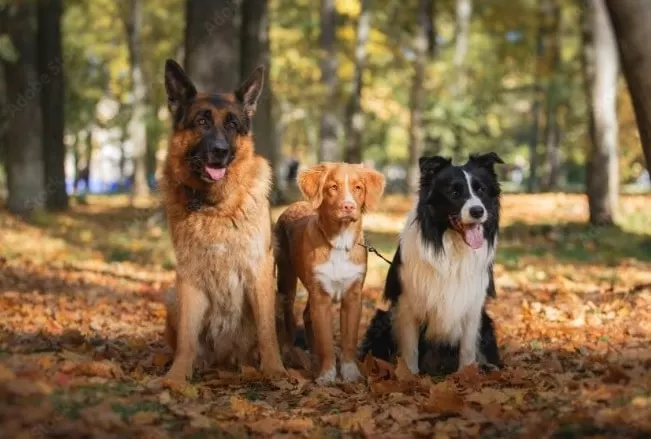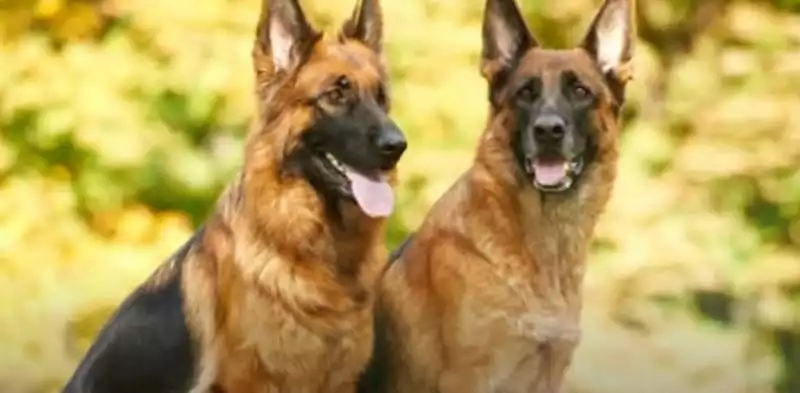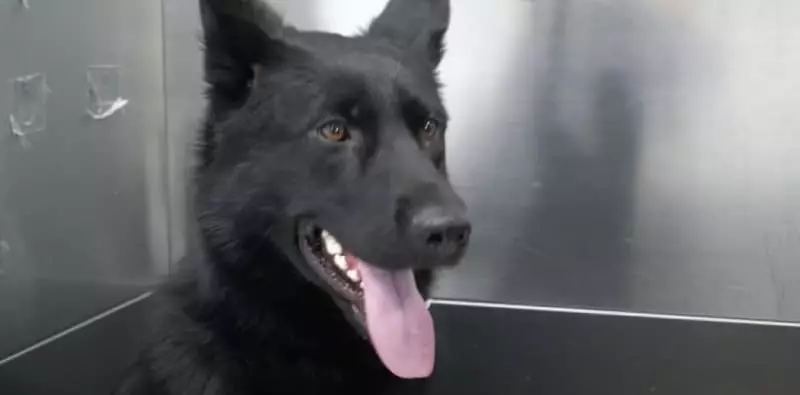One of the most common queries among potential GSD owners is, do German Shepherds and some other breed get along? Most German Shepherds are perfectly fine with other dogs in their family, mainly if introductions occurred when the dogs were puppies. So let’s look at 15 dogs German Shepherds get along with:

1. Labs
German Shepherds get along very well with labs as long as they are adequately introduced and taught to get along.
Both German Shepherds and Labradors are good-natured, intelligent, friendly dogs, and both generally get along well with other pets, so they will naturally get along well together.
Labs and German Shepherds have playful and energetic personalities, which help them form a close bond. Don’t doubt these two will keep you on your toes.
2. Pitbulls
German Shepherds and Pit bulls get along well generally as they share some characteristics. Both breeds are loyal, brave, and headstrong.
It can take time for a German shepherd to warm up to other dogs, so you must introduce a GSD to a Pitbull in a calm manner. However, they will become friends eventually.
As German Shepherds are somewhat larger than Pitbulls, you don’t want your Pitbull to feel intimidated or threatened by your GSD. However, after a rocky introduction, you should find that these two breeds have what it takes to be a great match.
3. Rottweilers
German Shepherds and Rottweilers get along; one of the Rottweilers’ most popular companion choices is a German shepherd.
Both German Shepherds and Rottweilers are aloof, so it may take time for them to become friends, but the German Shepherd is not easily bullied, thanks to his natural confidence.
Both breeds are highly intelligent, active, and sporty, and they both are highly trainable. Be sure to make the introduction a calm and gradual experience.
Having good control over a German Shepherd should help you to have an overall handle over his interaction with a Rottweiler.
4. Beagles
German Shepherds and Beagles get along. Both dogs are brilliant, attention-seeking, and active. The Beagle is a highly intelligent dog with a goofy, fun-loving personality.
German Shepherds are a little more serious and reserved, so you want to ensure that you introduce these dogs properly.
These dogs should grow up together from puppyhood, as a puppy can be a pest to an older dog. Beagles could annoy a more senior German Shepherd with their goofy nature, so you may want to keep dogs apart if there’s a bit of an age gap.
It’s okay for dogs to have boundaries. It’s normal and instinctive. If one dog is annoying the other, it’s only fair that that dog is given a warning.
5. Chihuahuas
German Shepherds do get along with chihuahuas. However, as both have dominant and strong personalities, bringing them together can be challenging.
It’s best to introduce the two dogs to each other as puppies; otherwise, introduce them gradually and monitor their interactions to correct destructive behaviors.
German Shepherds and Chihuahuas can become friends. GSDs have laid-back personalities, whereas the Chihuahua is a stubborn, feisty little dog.
While chihuahuas tend to love their owners, they don’t tend to get along well with other pets. Both have dominant personalities; because of this, don’t expect to throw them into a room and become friends. Both dogs need the training to get along, and it’s not going to happen quickly, so hang in there!
6. Corgis
German Shepherds and Corgis get along naturally; both breeds share many personality traits: courageous, smart, loyal dogs.
Many people are surprised to discover that these two dogs get along so well, as the Corgi is much smaller by comparison, but both dogs are friendly and energetic.
You still need to supervise them. Both dogs like to play, so someone could get hurt if they start fighting or trying to exert their dominance.
7. Dobermans

German Shepherds and Dobermans get along, at least they can, if they are well-bred, trained, and socialized from an early age.
However, you cannot expect to put these dogs together and leave them alone. Both dogs are dominant and territorial, so you must reduce competition-provoking situations.
Your German Shepherd and your Doberman getting along largely depend on their innate and individual personalities. Unfortunately, these dogs display same-sex aggression, so it’s best to get dogs of opposite sexes.
Thankfully, both dogs are trainable and intelligent, so as long as you train them and provide them with lots of mental stimulation, they should become the best of buds.
8. Alaskan Malamutes
German Shepherds and Alaskan Malamutes get along, especially if they are properly introduced to each other and well-supervised. Both dogs share many characteristics. Both are loyal, brave, hardworking, and energetic.
Both dog breeds adore their families, but they are wary of strangers and other dogs. To keep these dogs happy together, they need consistent training and lots of strenuous exercises.
9. Bernese Mountain Dogs
German Shepherds and Bernese Mountain dogs can get along if they are trained to do so. However, there is some same-sex aggression with Bernese Mountain dogs, so it’s best to raise them with the opposite gender. Bernese Mountain dogs are not as active or as trainable as German Shepherds.
Introducing your Bernese Mountain dog to your German Shepherd should be a calm experience. Bernese Mountain dogs tend to love their families but not so much with other pets, even other dogs. Their interactions shouldn’t be forced, but keep both dogs safe.
10. Border Collies
German Shepherds and Border Collies get along famously with each other; they have many qualities in common. Both dogs are large, hardworking breeds, and both are intelligent. In addition, they are both highly active, so they can play well together.
That said, Border Collies have some herding instincts; they are sheepdogs, after all, so you must step in immediately if playtime turns into a fight.
11. Boxers
German Shepherds and boxers get along. Both breeds enjoy play and exercise, they are big and strong, and a GSD can hold his own against a pushy Boxer. Boxers can be headstrong, but a highly-trained German Shepherd will be a good influence on your Boxer.
Many websites and organizations list Boxers as one of the most dangerous dogs in the United States; however, boxers can be dangerous if not properly trained. Otherwise, they can be an amazing companion and a great playmate for a German Shepherd.
12. Bulldogs
German Shepherds and Bulldogs get along. Bulldogs are often misunderstood, and some people think they are just fighters. This is not true. Bulldogs are loyal and affectionate and can make excellent companions for German Shepherds.
Some lines may not get along well, but they should become great buddies if you choose both dogs from a reputable breeder and train them to get along.
13. English Bulldogs
German Shepherds and English Bulldogs get along. English Bulldogs are very different from German Shepherds; as their name suggests, they are “bull” headed and don’t listen to commands.
In addition, they have a reputation for fighting, so they need to be trained to get along with your German Shepherd.
It’s possible that an English bulldog would annoy a German Shepherd, but if they are raised together as puppies, they should be great friends.
14. Yorkies
German Shepherds and Yorkies get along. You may think that GSDs and Yorkies are unlikely to be friends if you judge by appearance. But below the exterior differences, both dogs originate from the same species. Both come from Canis Lupus Familiaris or the ancient wolf.
Knowing that fact doesn’t guarantee that these dogs will become good friends, but it helps. Many factors contribute to how well a German Shepherd will get on with a Yorkie, and your input is vital. You must ensure that both dogs know that there is room for both of them.
It’s best to introduce them early; as the Yorkshire terrier is much smaller, and you need to ensure that he doesn’t get hurt during play. In addition, you must teach both dogs to respect each other.
15. Siberian Husky
German Shepherds and Siberian huskies get along very well. The husky is playful and somewhat mischievous, which can be ideal for your active German Shepherd.
Huskies are more outgoing than GSDs. However, huskies are on the gentler side, which can smooth some of the GSD’s rough edges.
The outgoing husky can help an aloof German Shepherd come out of his shell. Also, both are excellent family dogs, which allows them to settle into an active household.
Final Thoughts
As you can see, German Shepherds can get along with many different dog breeds. They can befriend intelligent, hardworking, and lazy, less intelligent dogs like the Bernese Mountain dog. When it comes to being this dog’s friend, size, breed, and personality traits are not as important as trust; ultimately, this dog must trust his friends.
You must try to keep your GSD away from aggressive dogs. You can help your GSD forge friendships with other dogs by socializing them early, spending ample time training them, and exposing them often. It’s the responsible thing to do, and it will keep your German Shepherd safe.
from Pet Dog FAQ https://www.petdogfaq.com/15-dogs-german-shepherds-get-along-with/





